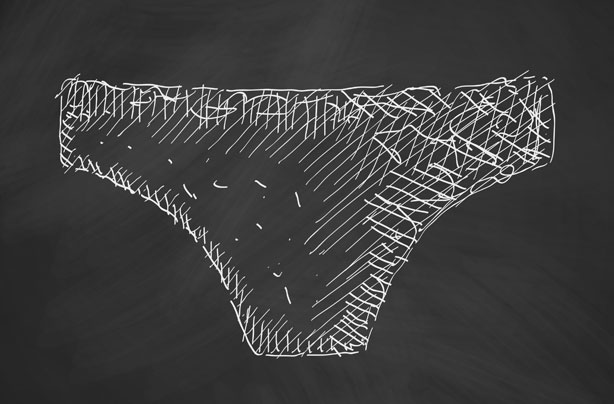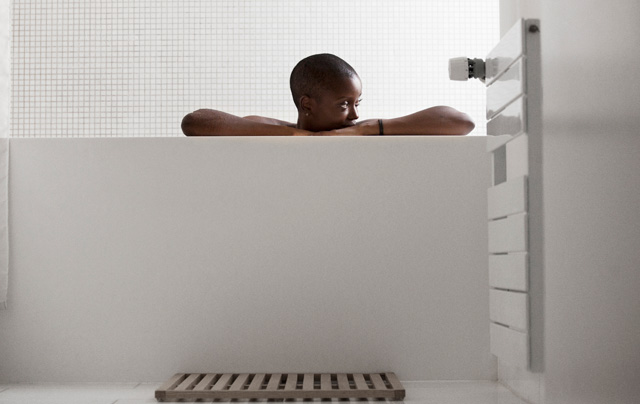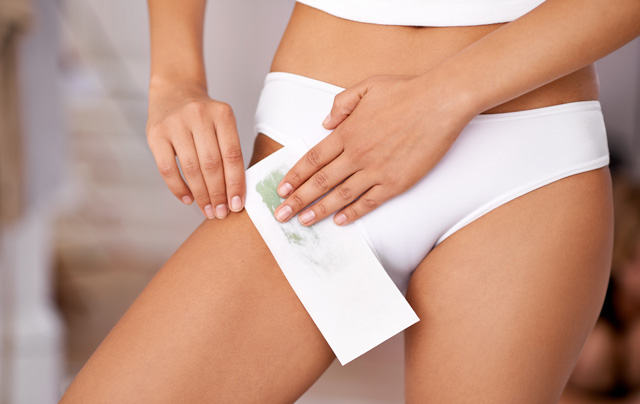Why is my vagina itchy? 14 reasons why you might have an itchy vagina and treatments you need to know about
Banish irritating itching for good with our helpful guide


An itchy vagina is one of the more difficult topics to talk about but there's no reason to feel embarrassed. Most women will experience a dry, itchy vagina at some point in there lives.
'Vaginal itching is a common symptom experienced by most women at some time throughout their lives and it can be irritating or painful,' says Dr Shree Datta, gynaecologist for intimate wellbeing brand INTIMINA.
There are a number of reasons why you might experience an irritated vaginal area or vaginal itching at night that keeps you awake. Fortunately, most of the reasons for an itchy vagina aren't a cause for concern.
However, some like thrush will need treatment. While there are home remedies for vaginal itching (more of those later) you may need to see a doctor or speak to a health professional. Here, we suggest some of the main reasons why you have an itchy vagina and how you can treat the problem to stop the itch and discomfort.
Why is my vagina itchy?
'Itchy skin is typically related to inflammation, dryness or other damage and there are a long list of causes,' says consultant physician to Rotherham Hospital and TV doctor Dr Naomi Sutton.
'But my first and most important piece of advice to any woman is to get a mirror and have a look at your own genitals. Know what your normal is. The vulva is the external genitals of a woman and the vagina is the internal tube which connects the vulva to the cervix.'
Reasons why you might have an itchy vagina and how to treat them:
Thrush and yeast infections
'The most common cause of itching of the vulva and vagina is Candida, commonly referred to as thrush,' says Dr Sutton. 'It's a fungal infection and one of the most common causes of an altered discharge in women. Itching is the hallmark of this infection most commonly, as well as the soreness it causes. The discharge is often described as thicker and cottage cheese-like.'
GoodtoKnow Newsletter
Parenting advice, hot topics, best buys and family finance tips delivered straight to your inbox.
If you have symptoms of thrush then you will need to 'treat it with over-the-counter remedies bought from pharmacies or prescribed by your GP,' says Dr Sutton. Thrush will not go away on its own so you should speak to your doctor if you think you have thrush.
Bacterial vaginosis
'Other infections such as bacterial vaginosis (BV) may cause an itch simply due to the increase in discharge, but this is not a common symptom,' says Dr Sutton. 'Bacterial vaginosis is a result of a change in the natural balance of the bacteria within the vagina. BV discharge is commonly described as thin and fishy smelling.'
According to the NHS, while bacterial vaginosis is 'not a sexually transmitted infection it can increase your risk of getting an STI such as chlamydia' so it's wise to get it seen to. 'Over-the-counter treatments are available from pharmacies or antibiotics can be prescribed by your GP for this condition,' says Dr Sutton.
Diabetes
'Certain health conditions may predispose you to getting thrush, such as diabetes,' warns Dr Sutton. 'This is because of the increased level of sugar in the blood and other bodily fluids which encourage fungal infections to grow.'
Her advice? 'Keeping a tight glucose control is key for prevention,' she says.
Menopause
Around the time of menopause, hormone changes can affect many parts of your body, including the genital area. 'This can cause several symptoms, including dryness, soreness, pain and itching,' says Dr Annice Mukherjee, physician and author of The Complete Guide to the Menopause.
'You are more at risk of vaginal itching in peri- to post-menopause. This is due to a fall in oestrogen circulating in your body, which results in lower oestrogen in your vagina,' she explains. 'Oestrogen naturally strengthens the walls of the vagina and lubricates the genitals to protect from friction, rubbing and infections. Your oestrogen levels drop with menopause hormone changes. This can cause thinning of the vaginal walls and excessive dryness, described as vaginal atrophy, and result in itching, pain, discomfort and an increased risk of infections.'
To combat this, hormone replacement therapy (HRT) can help to replenish hormone levels. Use water-based lubricants during sex and include more foreplay before penetration so you feel more aroused. Vaginal moisturisers can also be effective, but use ones created for this specific purpose and not other moisturisers, which are unsuitable for this delicate area. Your GP or pharmacist will be able to offer advice, or you can try an over-the-counter product such as Vagisil Medicated Creme.
Lichen sclerosus
'Lichen sclerosus is a genital skin condition that can also cause pain and itching down below,' says Dr Mukherjee. 'This condition causes itchy white patches on the genitals or other parts of the body. Affected areas are easily damaged, resulting in pain or bleeding.'
There's no cure for this skin condition but it can be managed. 'Treatment includes steroid creams to help relieve the symptoms,' says Dr Mukherjee. 'It's more common in women of menopausal age, so treating any associated menopause factors down below is also important.'
Eczema/psoriasis
'Good vulval skin care is essential for anyone suffering with a skin condition such as eczema, psoriasis or lichen sclerosus,' says Dr Sutton.
'Your GP may recommend other emollients or steroid creams for this delicate area. There is always a risk of irritation with skincare products. A symptom diary will help the doctor find a treatment tailored to the individual,' she explains.
Lichen planus
Lichen planus is another possible cause of an itchy vagina. This non-infectious rash can affect any part of the body including the vulva, where it will create sore, red patches that may itch. While this condition tends to clear up on its own it may take months – in the meantime, see your GP who can prescribe creams, ointments or light therapy to manage your symptoms. Avoid wearing tight-fitting clothes and use a covered ice pack on your genitals if the itching is severe.
For more information and advice about this skin disease, visit UK lichen planus.
Medication
If you're on any medication, it's advisable to check its side effects to determine whether itching is on the list. 'Ask your doctor to review any medications you are taking as some of these can also cause itching or yeast infection,' explains Dr Datta. 'For example, antibiotics can trigger Candida.'
Some birth control pills and hormone therapy may also cause vaginal itching.
Soap and toiletries
They make us feel and smell better but some personal care products can irritate or damage the vaginal area. 'Most toilettes contain chemicals and small amount of alcohol, which cause dryness and irritation, and some women have an allergy to these chemicals,' explains Dr Alex Eskander, senior consultant gynaecologist at The Gynae Centre in London.

It's not just soap and toiletries that cause itching. 'Scented detergents or fabric softeners can also irritate the vulval and vaginal skin,' says Dr Datta.
If you suspect that a product you're using down below is causing problems, discontinue use – even if it's a product you have used before.
'The vulva is a delicate area so wash with warm water or a gentle soap product only,' Dr Naomi Sutton adds. 'NEVER cleanse the vagina as it is a self-cleaning tube. Douching and excessive washing disrupts the normal bacterial flora needed to keep the vagina healthy and is strongly discouraged.'
Sanitary wear and feminine products
'There are a lot of feminine products on the market which are definitely not necessary and often contain added irritants. I advise to avoid,' says Dr Sutton. 'Parabens and glycerin contained in some lubricants can be an irritant to some women so it's worth checking the ingredients and avoiding these.'
While we may expect a reaction to such products, women can also be adversely affected by sanitary wear. 'Sanitary towels can contain adhesives and sometimes fragrances which can cause irritation,' she adds. Instead, Dr Sutton recommends you 'use a menstrual cup or washable period underwear. These are also environmentally-friendly and money saving!'
Vaginal grooming
Better known as removing your pubic hair, what's fashionable or preferable may not be what's best for you. 'Complete hair removal can result in the exposure of hair follicles and infection, which can result in irritation,' says Dr Eskander. So does that mean no more Bikinis, Brazilians Or Hollywoods for your nether regions? Not necessarily. The itching will subside and simple home remedies such as Sudocrem can soothe the skin, but resist the urge to scratch and be aware the regrowth can be a very itchy business, too.
If you like having short public hair Dr Eskander suggests 'partial removal by scissors, though short hair can also cause irritation.'

Pubic lice/STDs
'Sexually transmitted diseases are a main contender for having an itchy vagina. Lice, genital warts and genital herpes are all STDs that would cause itching,' says Dr Eskander.
There's also trichomoniasis (TV) to consider. While rare it's unlikely to go away without treatment. 'A parasite causes TV,' says Dr Sutton. 'Alongside an increase in discharge, women will often complain of feeling sore internally. This needs to be diagnosed, in most cases, at a sexual health clinic,' she advises.
If you're sexually active, get regular check-ups at a sexual health centre. If you think you have an STD, see a GP or sexual health professional as soon as possible.
And while this isn't an STD, some women are allergic to the latex in condoms. A reaction can cause vaginal itching and soreness.
Vaginismus
'Itching at the vulva and or vagina opening is very common but if you don't handle this carefully, you can eventually develop vaginismus,' says counsellor Jacqueline van de Bilt, author of How To Overcome Your Vaginismus. 'Itching could be caused by your skin’s reaction to products, such as shower gel, which contains components that you are hypersensitive or allergic to, wearing too-tight trousers that rub along your vulva, fungal infections, and repeated bladder infections.
'Because of the itching, you can start scratching unconsciously, or consciously, which can cause pain and sometimes wounds. Because of the pain this causes, the entire pelvic floor area cramps, which could result in the pelvic floor muscles becoming so cramped that eventually allowing a finger or penis into the vagina becomes difficult, painful or impossible,' says Jacqueline. Vaginismus may develop – this is a condition when vaginal muscles tense up on their own, causing pain during sex or when inserting a tampon.
This can be a very stressful condition for many women but there is help available. 'The chance of solving vaginismus is greater with a combined approach of a doctor, pelvic physiotherapist and a coach or psychologist,' says Jacqueline.
Vulval cancer
Dr Sutton stresses that, while rare, vulval cancer 'is an important diagnosis not to be missed.'
Symptoms include a 'persistent itch with other changes such as vulval pain or tenderness, a wart or lumpy growth, raised or thickened skin, changes in the colour or the skin (red, dark or white) or an open sore or breaks in the skin which do not heal.'
If you experience such symptoms for six weeks or more, you'll need to be checked out by a healthcare professional.
Why you might experience vaginal itching at night
If you're wondering why is my vagina itchy at night you'll probably want to sort it sooner rather than later. This annoying problem will prevent you from getting a good night's sleep.
'Genital itching at night can be due to hormone factors influenced by your body clock,' explains Dr Mukherjee. 'The itch/scratch cycle in many skin conditions tends to be driven at night. This is when you're less aware and can unknowingly be scratching and inadvertently worsening inflammation down below. Equally, itching at night can keep you awake and add to daytime symptoms of fatigue.'
'Lichen sclerosus can lead to symptoms of vaginal itching, which are worse at night, adds Dr Datta. 'Going to your doctor can help diagnose this, as it can increase your risk of vulval cancer.'
Other reasons, says Dr Datta, may be 'having sex or going through the menopause. Equally, symptoms may simply feel worse at night when you're not busy or rushing about,' she explains.

Home remedies for vaginal itching
'Some causes of vaginal itching will require medication treatment,' says Dr Dratta. 'But there are several things you can do to optimise your vaginal health at home.' Here are her suggestions:
- Avoid internal douching, or using scented soaps and irritating detergents.
- Optimise your health – for example, avoid an erratic lifestyle with lots of late nights.
- If you have a history of skin conditions such as eczema, use moisturising creams and washes prescribed by your doctor. Use these on the outside skin around your vagina.
- Avoid tight, synthetic underwear which can irritate your vaginal skin.
- Try health supplements and limit your alcohol intake.
- Stop smoking where possible.
- Try to avoid a high sugar diet, which can encourage yeast infections – particularly if you are diabetic. Try a sugar free diet or at least cutting back on your sugar intake.
- Look at symptoms you have in other parts of your body. This is a good indicator of your general immune response.
- Use a condom with any new sexual partner, and make sure you have both had sexual health checks.
- Always remember to wipe from front to back.
- Don't forget it takes time to see the results of any changes you make, so be patient. If symptoms persist or get worse, see your doctor to identify any problems early and get prompt treatment.

Debra Waters is an experienced online editor and parenting writer. She also has a strong background on health, wellbeing, beauty, and food. She currently writes for Goodto and Woman&Home, and print publications Woman, Woman’s Own, and Woman’s Weekly. Debra has written for What to Expect, Everyday Health, and Time Out. In addition, she has had articles published in The Telegraph and The Big Issue.